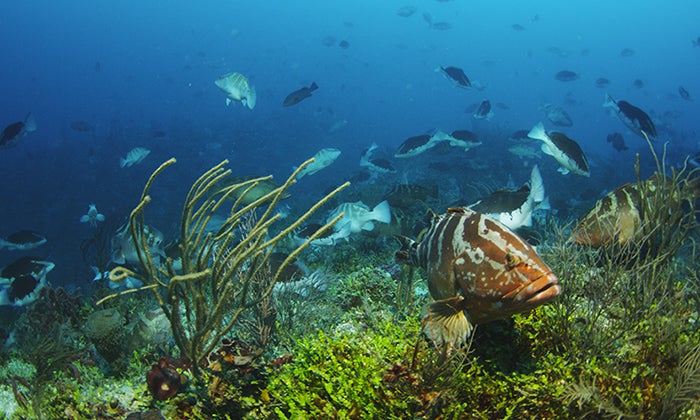Assistant Professor Releases New Study
Study Shows Climate Change May Hinder Fish Conservation Efforts
For more than 20 years, conservationists in the Caribbean have been working to protect the endangered Nassau grouper. Thanks to those efforts, populations of this critical reef fish have stabilized in some areas.
However, in a new paper authored by researchers from East Carolina University and the University of Texas at Austin, marine scientists show that climate change may severely hinder these conservation efforts by the end of this century.
By 2100, breeding habitats are projected to decline by 82 percent from 2000 levels if nothing is done to mitigate climate change, according to the report published in the July issue of the journal Diversity and Distributions. These spawning habitats are critical to the survival of the species. Additionally, suitable habitats for non-spawning fish are expected to decline by 46 percent.

The Nassau grouper has been endangered by overfishing, but could soon face spawning threats due to climate change. (Photo credit: Alfredo Barroso)
“To truly understand how climate will impact fishes, we need to know how it will impact the most vulnerable life history stage – spawning. If this link in the life cycle is jeopardized, the species as a whole will be in jeopardy,” said Rebecca G. Asch, an assistant professor of fisheries biology at ECU.
The Nassau grouper is one of the most recognizable reef fish in the Caribbean and, as a top predator, the fish contributes significantly to the ecosystem and can act as a warning system for overall reef health.
Nassau groupers depend on the success of their spawning aggregations, where hundreds to thousands of fish gather in one area for a few days to mate. These mass spawning events make them easy targets for fishers and they were overfished to the point the species became endangered.
Beginning in the 1990s, several countries, including the United States, have put outright bans on fishing Nassau grouper. Other countries, like Cuba and the Dominican Republic, restrict fishing during their winter spawning season. Other areas have restricted fishing in specific breeding grounds.
The paper points out that because Nassau groupers have a narrow temperature range they can tolerate while spawning, this may create a bottleneck that will impact population recovery.
“The concern is that the effects of climate change may override some of the successes of conservation efforts at local and regional scales,” said Brad Erisman, assistant professor of fisheries biology at UT Austin. “That is, if Nassau grouper no longer migrate to spawn in a particular region because the water is too warm, then protecting spawning sites in that region will be ineffective. Likewise, if the months when spawning occurs in certain regions shifts in response to climate change, then seasonal protection measures in those regions will need to shift accordingly to ensure that spawning is still protected.”
Large breeding events, called spawning aggregations, are important for the health of the ecosystem. Large predators, like sharks, feed on the gathered grouper. Whale sharks and manta rays feed on the eggs that are released.
There is some good news, the scientists said. If strong steps are taken to mitigate climate change, breeding habitat is projected to decline by only 30 percent.
The scientists plan to expand their research to look at how climate change may affect spawning in 12 species of grouper and snapper in the Caribbean and the Pacific. The model developed could aid researchers in studying climate change impacts on other fish species that depend on large spawning events.
Funding for the research was provided by the Nippon Foundation-Nereus Program and the National Academy of Sciences Gulf Research Program Early Career Fellowship.
Asch received a prestigious Sloan Research Fellowship in February in the field of ocean sciences. Her work focuuses on how warming oceans lead some marine species to change their reproductive habits, causing them to reproduce at different times of the year than in the past and affecting the way they interact with their food sources. Asch’s work has been reported in national outlets such as the New York Times, the Los Angeles Times, CNN, NPR, FOX, Newsweek and The Huffington Post.